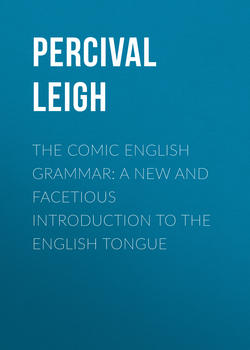Читать книгу The Comic English Grammar: A New And Facetious Introduction To The English Tongue - Leigh Percival - Страница 3
PART II. ETYMOLOGY
CHAPTER I. A COMICAL VIEW OF THE PARTS OF SPEECH
ОглавлениеEtymology teaches the varieties, modifications, and derivation of words.
The derivation of words means that which they come from as words; for what they come from as sounds, is another matter. Some words come from the heart, and then they are pathetic; others from the nose, in which case they are ludicrous. The funniest place, however, from which words can come is the stomach. By the way, the Mayor would do well to keep a ventriloquist, from whom, at a moment's notice, he might ascertain the voice of the corporation.
Comic Etymology teaches us the varieties, modifications, and derivation, of words invested with a comic character.
Grammatically speaking, we say that there are, in English, as many sorts of words as a cat is said to have lives, nine; namely, the Article, the Substantive or Noun, the Adjective, the Pronoun, the Verb, the Adverb, the Preposition, the Conjunction, and the Interjection.
Comically speaking, there are a great many sorts of words which we have not room enough to particularise j individually. We can therefore only afford to classify them. For instance; there are words which are spoken in the Low Countries, and are High Dutch to persons of quality.
Words in use amongst all those who have to do with horses.
Words that pass between rival cab-men.
Words spoken in a state of intoxication.
Words uttered under excitement.
Words of endearment, addressed by parents to children in arms.
Similar words, sometimes called burning, tender, soft, and broken words, addressed to young ladies, and whispered, lisped, sighed, or drawled, according to circumstances.
Words of honor; as, tailors' words and shoemakers' words; which, like the above-mentioned, or lovers' words, are very often broken.
With many other sorts of words, which will be readily suggested by the reader's fancy.
But now let us go on with the parts of speech.
1. An Article is a word prefixed to substantives to point them out, and to show the extent of their meaning; as, a dandy, an ape, the simpleton.
One kind of comic article is otherwise denominated an oddity, or queer article.
Another kind of comic article is often to be met with in some of our monthly magazines.
2. A Substantive or Noun is the name of anything that exists, or of which we have any notion; as, tinker, tailor, soldier, sailor, apothecary, ploughboy, thief.
Now the above definition of a substantive is Lindley Murray's, not ours. We mention this, because we have an objection, though, not, perhaps, a serious one, to urge against it; for, in the first place, we have "no notion" of impudence, and yet impudence is a substantive; and, in the second, we invite attention to the following piece of Logic,
A substantive is something,
But nothing is a substantive;
Therefore, nothing is something.
A substantive may generally be known by its taking an article before it, and by its making sense of itself; as, a treat, the mulligrubs, an ache.
3. An Adjective is a word joined to a substantive to denote its quality; as a ragged regiment, an odd set.
You may distinguish an adjective by its making sense with the word thing: as, a poor thing, a sweet thing, a cool thing; or with any particular substantive, as a ticklish position, an awkward mistake, a strange step.
4. A Pronoun is a word used in lieu of a noun, in order to avoid tautology: as, "The man wants calves; he is a lath; he is a walking-stick.''
5. A Verb is a word which signifies to be, to do, or to suffer: as, I am; I calculate; I am fixed.
A verb may usually be distinguished by its making sense with a personal pronoun, or with the word to before it: as I yell, he grins, they caper; or to drink, to smoke, to chew.
Fashionable accomplishments!
Certain substantives are, with peculiar elegance, and by persons who call themselves genteel, converted into verbs: as, "Do you wine?" "Will you liquor?"
6. An Adverb is a part of speech which, joined to a verb, an adjective, or another adverb, serves to express quality or circumstance concerning it: as, "She swears dreadfully; she is incorrigibly lazy; and she is almost continually in liquor."
7. An Adverb is generally characterised by answering to the question, How?'how much? when? or where? as in the verse, "Merrily danced the Quaker's wife," the answer to the question, How did she dance? is, merrily.
8. Prepositions serve to connect words together, and to show the relation between them: as, "Off with his head, so much for Buckingham!"
9. A Conjunction is used to connect not only words, but sentences also: as, Smith and Jones are happy be~ cause they are single. A miss is as good as a mile.
10. An Interjection is a short word denoting passion or emotion: as, 'Oh, Sophonisba! Sophonisba, oh!" Pshaw! Pish! Pooh! Bah! Ah! Au! Eughph! Yaw! Hum! Ha! Lauk! La! Lor! Heigho! Well! There! &c.
Among the foregoing interjections there may, perhaps, be some unhonored by the adoption of genius, and unknown in the domains of literature. For the present notice of them some apology may be required, but little will be given; their insertion may excite astonishment, but their omission would have provoked complaint: though unprovided with a Johnsonian title to a place in the English vocabulary, they have long been recognised by the popular voice; and let it be remembered, that as custom supplies the defects of legislation, so that which is not sanctioned by magisterial authority may nevertheless be justified by vernacular usage.
